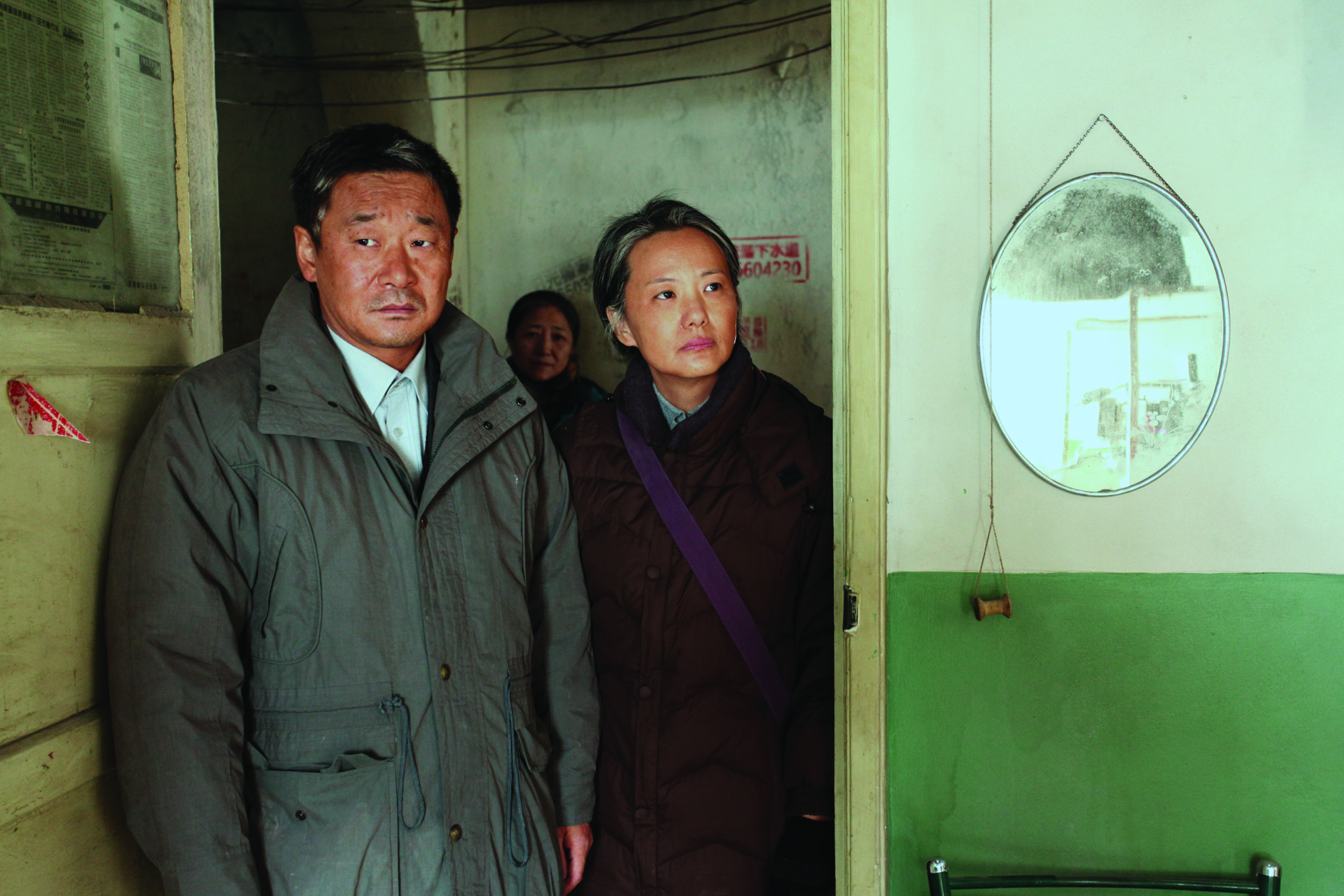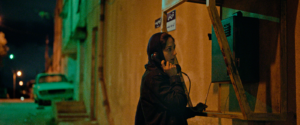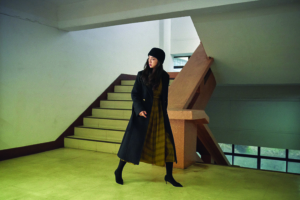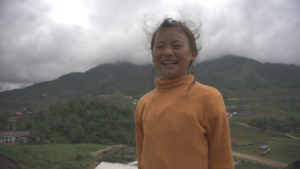In So Long, My Son (2019), Wang Xiaoshuai weaves a beautiful tapestry of life in modern China. Spanning four decades – from the 1980s to today – the film eschews epic traditions for an intimate examination of domesticity, hope and guilt against the backdrop of a rapidly changing culture. Wang and A Mei’s screenplay interlaces interconnected narrative filaments across different eras with confident fluidity. That can be confusing; as we thread from one decade to another with an easy jump cut, particulars of the storyline are tangled and obfuscated. Yet Wang’s deft command of his film’s formal qualities ensures that So Long, My Son is defined by an emotional clarity that resonates long after the credits roll.
We’re introduced to the story somewhere around its middle, opening on two prepubescent boys above a reservoir. Below them, their peers splash and play in the shallow water by the shore. We see a juxtaposition between the two boys above and their distant friends, then a juxtaposition between the meeker Xingxing, who protests that he can’t swim, and the more enthusiastic Haohao, who urges his friend to join him in the water. Wang’s camera is proximate but naturalistic, observing without passing judgement. The contrast between the two boys isn’t hierarchical, and, while that might seem like a minor distinction, it presages So Long, My Son’s generous approach to its characters across the near-three hours that follow.
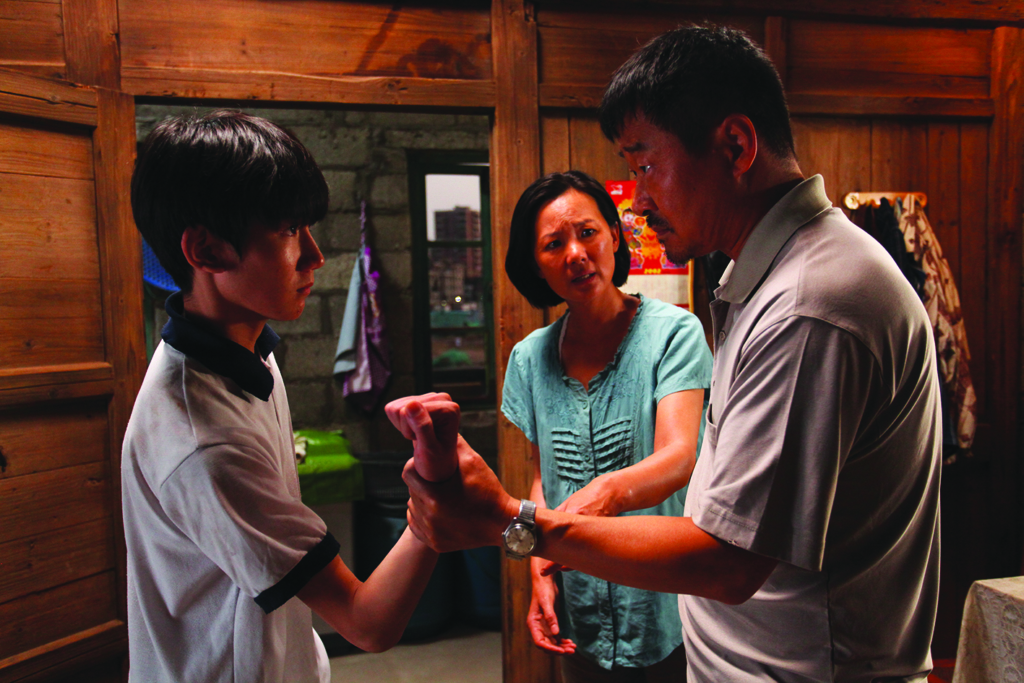
There are more juxtapositions to come. Chief editor Lee Chatametikool – a master of evoking natural rhythms, as evidenced in his collaborations with Apichatpong Weerasethakul – glides from the reservoir to a run-down machinery-repair store years later without any overt clues to demarcate the different eras. The film intercuts between scenes of Yaojun (Wang Jingchun) and Liyun (Yong Mei) that are a decade apart. In one moment, they’re frantically rushing to carry a seemingly drowned Xingxing, their son, to hospital; in the next, they clash with an older Xingxing (Wang Yuan) over teenage indiscretions (theft, defiance).
While the emotional tenors of these two events are distinct, the contrast is illuminating rather than jarring. In the space of a few minutes – with characters we’ve only just been introduced to, in contexts we don’t fully understand – director Wang illustrates the broad scope of parenting. There might be years between these instances of, on one hand, terror and, on the other, frustration, but they encapsulate the paradoxes of the caregiving mantle imposed on mothers and fathers. We don’t need to know in which decade Xingxing fell into the reservoir, nor precisely what brought him from the safer upper ground to the precarious shallows, in order to understand the primal emotion on his parents’ faces – though, in time, we will come to understand the true circumstances behind these scenes.
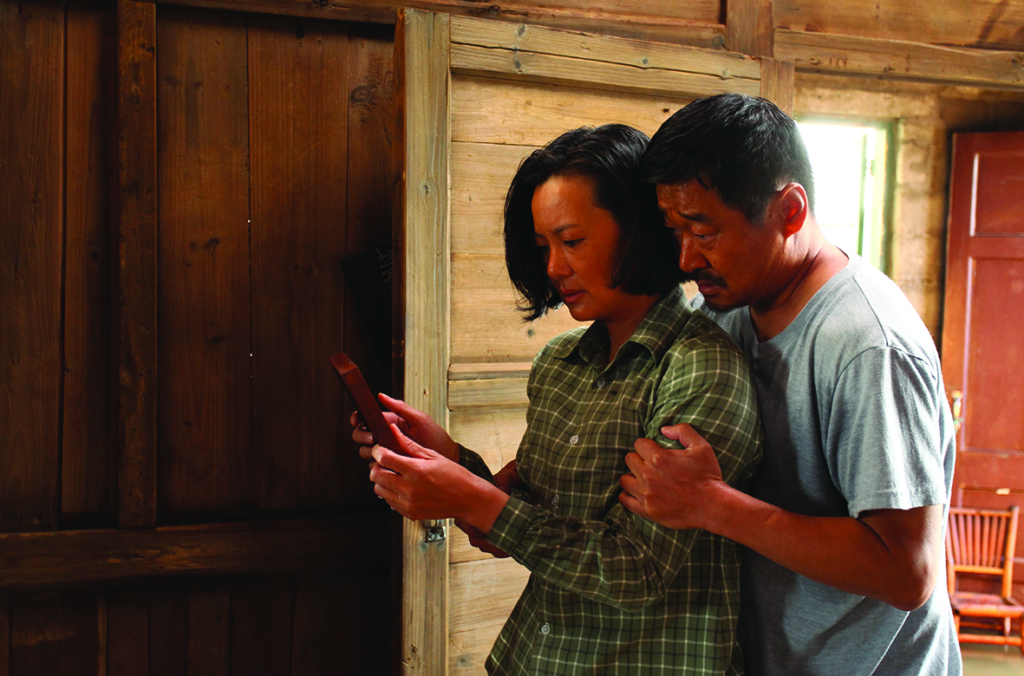
So Long, My Son goes on to reveal that the events in the intervening years between these two episodes are far more complicated than initial impressions may suggest. As we eventually come to understand, Yaojun and Liyun’s panicked dash to the hospital to save their son was unsuccessful. The boy they call ‘Xingxing’ is a different boy, whose precise parentage the screenplay obscures with the same casualness as that with which the editor cuts between times. This information isn’t clear – or, at least, it wasn’t to me – during the film’s first hour, but it retrospectively lends lines like Yaojun’s complaint that ‘he may look like Xingxing, but he’s not our son’ added layers beyond my assumed figurative interpretation.
This is a direct consequence of Wang’s deliberate emphasising of emotion over story. Following the film’s screenings at this year’s Berlinale, he explained his intentions in an interview with Asian Movie Pulse:
Well, this story is especially hard to tell in a linear, chronological fashion. Your privilege as a director is to be a god, because you have got all that timespan with you, this is something you have been going through, so you can re-arrange it in order to concentrate on certain moments and events that are particularly important. I wanted to design it as a coherent story. During the flashback sequences in the film, I have not been trying to be particularly clear about what date and what decade they are taking place, so the viewer does not have to keep track of all those time points. You just have to keep track of what is happening.[1]Wang Xiaoshuai, quoted in Marko Stojiljković, ‘Berlinale Interview – Wang XiaoShuai: “Censorship Does Exist, but What Should We Be More Vigilant About Is the Possibility of Self-censorship”’, Asian Movie Pulse, 21 February 2019, <https://asianmoviepulse.com/2019/02/berlinale-interview-wang-xiaoshuai-censorship-does-exist-but-what-should-we-be-more-vigilant-about-is-the-possibility-of-self-censorship/>, accessed 5 August 2019.
Wang’s description suggests a labyrinthine narrative stuffed with mysteries. That’s not an entirely inaccurate way of framing So Long, My Son, which keeps many of its ambiguities shrouded in shadows until well into its final hour. Even at the conclusion of its imposing running time, some details remain unclear.
Wang illustrates the broad scope of parenting. There might be years between these instances of, on one hand, terror and, on the other, frustration, but they encapsulate the paradoxes of the caregiving mantle imposed on mothers and fathers.
I made the assumption, for instance, that the ‘new’ Xingxing (whose real name, we later learn, is Yongfu) is Yaojun’s bastard son, conceived with co-worker Moli (Qi Xi) and subsequently adopted by Yaojun and Liyun. In her review, The Hollywood Reporter’s Deborah Young shared my interpretation,[2]Specifically, she writes: ‘A little later, another life is conceived by Yaojun’s former teaching assistant, Moli […] This pretty, sophisticated girl has landed a good job and is about to move abroad. But first she seduces her old teacher to satisfy a whim. That single time is enough to get her pregnant. Rather cruelly, she leaves it up to poor Yaojun to decide whether she should abort the baby, or give it to him and Liyun to raise. Obviously the baby is Xing, who goes to live with the bereaved parents and becomes an unacknowledged stand-in for their lost Xingxing.’ See Deborah Young, ‘So Long, My Son (Di jiu tian chang): Film Review | Berlin 2019’, The Hollywood Reporter, 14 February 2019, <https://www.hollywoodreporter.com/review/long-my-son-1186667>, accessed 5 August 2019. but Variety’s Jessica Kiang instead proffers that the couple merely adopted ‘an orphan boy’.[3]Jessica Kiang, ‘Film Review: So Long, My Son’, Variety, 14 February 2019, <https://variety.com/2019/film/reviews/so-long-my-son-review-wang-xiaoshuai-1203138084/>, accessed 5 August 2019. That two such reputable publications could differ so substantially on such a key plot point might seem surprising, but it’s merely a result of the way Wang has approached the story. When Yaojun and Liyun interact with their adopted son, their reality in that moment is defined not by the complexities of his backstory, but by the emotional complexities of their present relationship with him, which have nothing to do with how he was born and everything to do with who he is now.
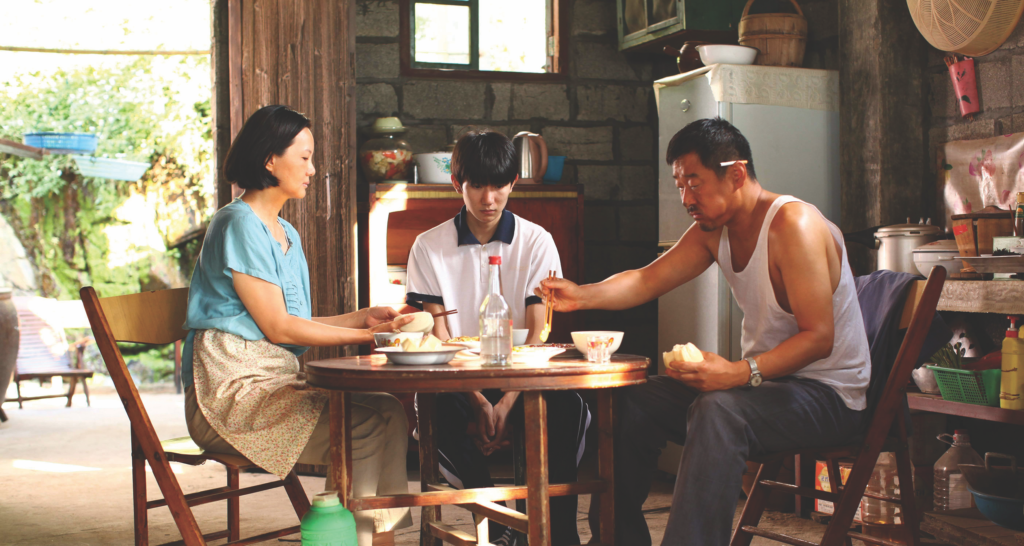
Although So Long, My Son puts the onus on its audience to unpack its nonlinear structure and various obscurities, its inevitable revelations uncharacteristically avoid melodrama. The most significant example of this is found around the midpoint of the film’s last hour. Having carefully circled its characters across decades over the preceding scenes, the film spends every moment of its final stretch, which breaks from the nonlinear structure, in the present day. Well, almost every moment. The exception comes when Haohao (Du Jiang) – that enthusiastic young boy from the reservoir, now a young doctor – confesses to Yaojun and Liyun his role in Xingxing’s death (a result of peer pressure, shame and childish obliviousness to consequences).
In any other film, this would be a devastating reveal: a long-gestating pay-off to the tragedy of the opening scene. But Wang doesn’t play it like that. Instead, the now-elderly couple only shed silent tears, with Haohao the one racked with emotion. ‘Let it out, son,’ Liyun tells him after he finishes his story. ‘You’ll feel better.’ Their comparatively reserved response is explained in a single break from the present – a flashback that shows Haohao’s father, Yingming (Xu Cheng), handing Yaojun a hatchet, intending to offer his son as sacrifice. Yaojun refuses the dreadful offer: ‘He’s just a child. If you never mention it, he’ll put it behind him.’ It turns out that the secret hanging over the film since its opening frames was never a secret at all.
This underlines Wang’s unconventional but moving approach to dramaturgy. Rather than focus on the losses and betrayals inflicted on his characters, he instead chooses to emphasise how they move past such defining moments. As discussed earlier, the film’s formal elements – the nonlinear storytelling, the camerawork and especially the sensitive performances by the leads[4]Yong’s and Wang Jingchun’s work earned each of them Silver Bear acting awards at the 2019 Berlin International Film Festival. – combine to offer a non-judgemental view on proceedings. The narrative’s structure is like the intricate lattice of memory, wherein key moments flood in out of order, but the sharpness of their pain is dulled by time. The camerawork is particularly captivating; it recalls a more naturalistic take on Yasujirō Ozu’s observational aesthetic, with the often-handheld camera fulfilling the role of an interested but dispassionate bystander. And the actors do exceptional work to maintain the emotional clarity enabled by such contemplative filming.
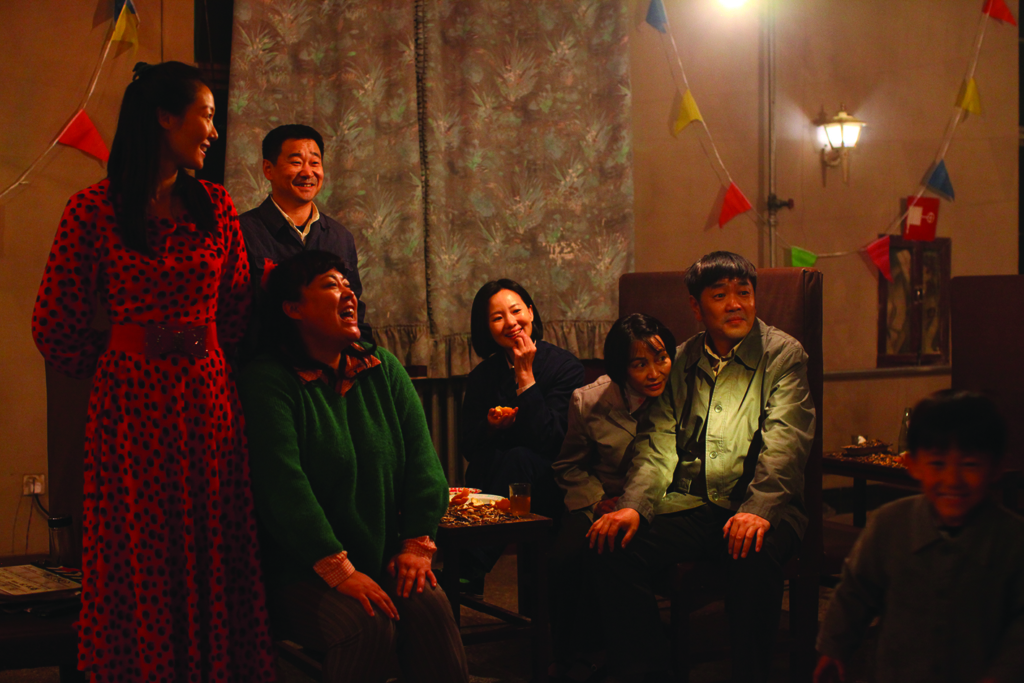
The net effect is a film that focuses on the themes of guilt and forgiveness. Much like in Wang’s 2014 film Red Amnesia, itself a nonlinearly structured ‘reflection on long-buried guilt’,[5]Dave Crewe, ‘BAPFF: Red Amnesia (2014)’, ccpopculture, 4 December 2014, <https://ccpopculture.com/2014/12/04/bapff-red-amnesia-2014/>, accessed 5 August 2019. in So Long, My Son, it’s forgiveness that’s ultimately privileged, with the narrative concluding on a profoundly hopeful note, notwithstanding its many traumas.
I haven’t touched on So Long, My Son’s political context yet, which might seem like an omission; other reviews have framed the film as an exploration of ‘the repercussions, cultural and psychological, of Chinese national policy’[6]Jonathan Romney, ‘So Long, My Son: Berlin Review’, Screen Daily, 15 February 2019, <https://www.screendaily.com/reviews/so-long-my-son-berlin-review/5137002.article>, accessed 5 August 2019. or, specifically, the ‘fallout from [the] one-child policy in China’.[7]Clarence Tsui, ‘Berlin 2019: So Long, My Son Film Review – Fallout from One-child Policy in China Explored’, South China Morning Post, 15 February 2019, <https://www.scmp.com/culture/film-tv/article/2186255/berlin-2019-so-long-my-son-film-review-fallout-one-child-policy>, accessed 5 August 2019. These are accurate encapsulations of the film, but, despite Wang’s representation of the encroaching autocratic tendencies of contemporary China and their devastating effects, the film’s political content always feels secondary to the emotional exploration of its characters’ lives.
Despite Wang’s representation of the encroaching autocratic tendencies of contemporary China and their devastating effects, the film’s political content always feels secondary to the emotional exploration of its characters’ lives.
That’s in large part a consequence of the film’s non-judgemental perspective. The impacts of Chinese policy in the wake of the Cultural Revolution may be ruthlessly depicted in So Long, My Son – whether it’s the one-child policy forcing Liyun to have an abortion that leaves her infertile, or a co-worker, Xinjian (Zhao Yanguozhang), being jailed for his attendance at a lights-out party branded by the state as ‘debauchery’ – but they are also carefully explored. The after-effects of Liyun’s abortion are tempered by her adoption of her new son. And, when we meet Xinjian again decades later, his flamboyant ‘Hong Kong movie star’ style traded for short-clipped hair, he seems happy enough.
This isn’t to suggest that So Long, My Son has a positive view of such policies; indeed, it’s fair to characterise the film as a political critique of this era. But such implicit criticisms are balanced – even blunted – by two factors.[8]Arguably, there’s a third factor, too: the spectre of Chinese censorship, which threatened to derail the director’s career from the start – after the release of his first film, The Days (1993), he was subject to a filmmaker ban for a number of years. See ‘Wang Xiaoshuai’, Chinese Shadows & Asian Shadows website, <https://www.chineseshadows.com/wang-xiaoshuai>, accessed 5 August 2019. The first is how the film focuses on the characters’ experiences instead of the state apparatus that gives rise to their traumas; this is principally a humanistic film, interested in how we adapt within our circumstances rather than interrogating said circumstances. The second is the film’s expansive timeline, which contrasts the traumas associated with China’s economic rise over the past half-century with the improvement in living standards that this has led to for much of its population. There’s a jarring juxtaposition between the borderline poverty in which So Long, My Son’s characters subsist early on in the film’s timeline and the comparative wealth depicted in its final hour. When Yaojun and Liyun return from their provincial surrounds to the city in which they once worked, they find Yingming and his family inhabiting a luxurious apartment, while the dilapidated factory dormitories in which they used to live have been abandoned by a comparatively prosperous populace.
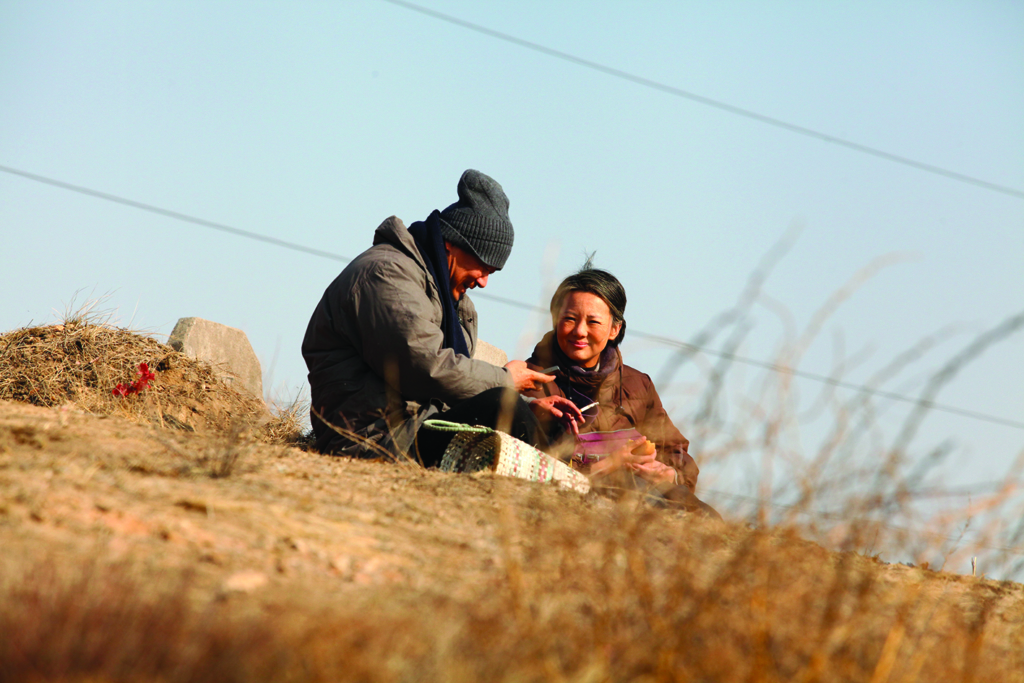
(China’s accelerated economic growth even affected filming, necessitating the construction of sets to mimic less affluent eras of the country’s history. Wang explained in an interview with Variety that ‘China is changing so fast that it is really hard to find the old things my movie required’.[9]Wang Xiaoshuai, quoted in Patrick Frater, ‘Wang Xiaoshuai Tackles China’s Big Issues in So Long, My Son’, Variety, 10 February 2019, <https://variety.com/2019/film/asia/wang-xiaoshuai-tackles-china-big-issues-so-long-my-son-1203134515/>, accessed 5 August 2019.)
It’s not that Wang is arguing that the cruelty connected with the implementation of China’s policies can be forgiven as a result of associated economic growth. He’s not arguing anything at all. Instead, he’s simply crafted a sympathetic yet expansive tapestry of life in all its colours. The themes underpinning the film are sadness and joy, guilt and forgiveness, loss and love. Yet, above all, So Long, My Son is a profoundly nostalgic film, an expressive evocation of the longing for a time that never really existed, when hope and pain and happiness are impossibly intermingled. At its simplest, this is a film about life.
Endnotes
| 1 | Wang Xiaoshuai, quoted in Marko Stojiljković, ‘Berlinale Interview – Wang XiaoShuai: “Censorship Does Exist, but What Should We Be More Vigilant About Is the Possibility of Self-censorship”’, Asian Movie Pulse, 21 February 2019, <https://asianmoviepulse.com/2019/02/berlinale-interview-wang-xiaoshuai-censorship-does-exist-but-what-should-we-be-more-vigilant-about-is-the-possibility-of-self-censorship/>, accessed 5 August 2019. |
|---|---|
| 2 | Specifically, she writes: ‘A little later, another life is conceived by Yaojun’s former teaching assistant, Moli […] This pretty, sophisticated girl has landed a good job and is about to move abroad. But first she seduces her old teacher to satisfy a whim. That single time is enough to get her pregnant. Rather cruelly, she leaves it up to poor Yaojun to decide whether she should abort the baby, or give it to him and Liyun to raise. Obviously the baby is Xing, who goes to live with the bereaved parents and becomes an unacknowledged stand-in for their lost Xingxing.’ See Deborah Young, ‘So Long, My Son (Di jiu tian chang): Film Review | Berlin 2019’, The Hollywood Reporter, 14 February 2019, <https://www.hollywoodreporter.com/review/long-my-son-1186667>, accessed 5 August 2019. |
| 3 | Jessica Kiang, ‘Film Review: So Long, My Son’, Variety, 14 February 2019, <https://variety.com/2019/film/reviews/so-long-my-son-review-wang-xiaoshuai-1203138084/>, accessed 5 August 2019. |
| 4 | Yong’s and Wang Jingchun’s work earned each of them Silver Bear acting awards at the 2019 Berlin International Film Festival. |
| 5 | Dave Crewe, ‘BAPFF: Red Amnesia (2014)’, ccpopculture, 4 December 2014, <https://ccpopculture.com/2014/12/04/bapff-red-amnesia-2014/>, accessed 5 August 2019. |
| 6 | Jonathan Romney, ‘So Long, My Son: Berlin Review’, Screen Daily, 15 February 2019, <https://www.screendaily.com/reviews/so-long-my-son-berlin-review/5137002.article>, accessed 5 August 2019. |
| 7 | Clarence Tsui, ‘Berlin 2019: So Long, My Son Film Review – Fallout from One-child Policy in China Explored’, South China Morning Post, 15 February 2019, <https://www.scmp.com/culture/film-tv/article/2186255/berlin-2019-so-long-my-son-film-review-fallout-one-child-policy>, accessed 5 August 2019. |
| 8 | Arguably, there’s a third factor, too: the spectre of Chinese censorship, which threatened to derail the director’s career from the start – after the release of his first film, The Days (1993), he was subject to a filmmaker ban for a number of years. See ‘Wang Xiaoshuai’, Chinese Shadows & Asian Shadows website, <https://www.chineseshadows.com/wang-xiaoshuai>, accessed 5 August 2019. |
| 9 | Wang Xiaoshuai, quoted in Patrick Frater, ‘Wang Xiaoshuai Tackles China’s Big Issues in So Long, My Son’, Variety, 10 February 2019, <https://variety.com/2019/film/asia/wang-xiaoshuai-tackles-china-big-issues-so-long-my-son-1203134515/>, accessed 5 August 2019. |
